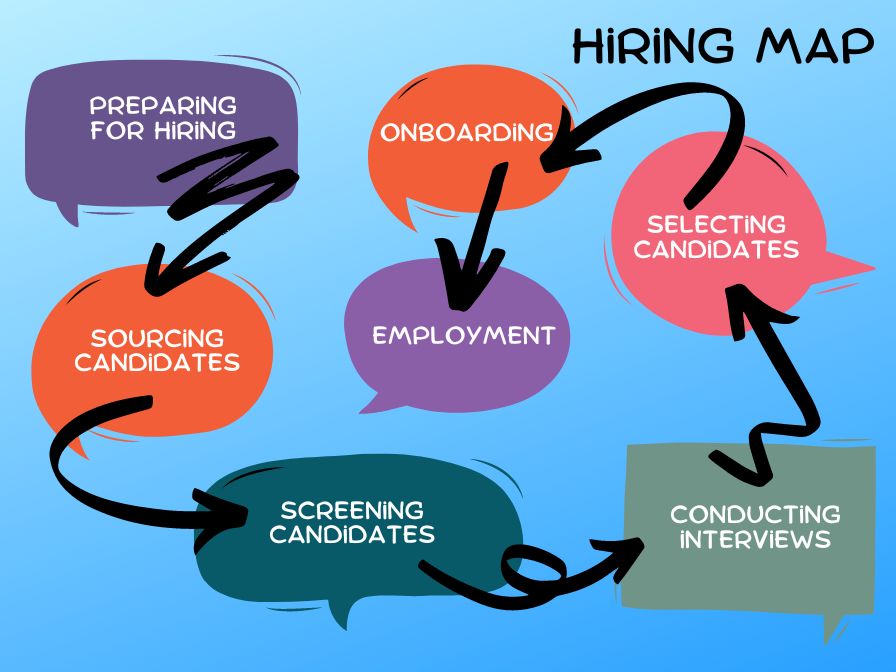Preparing for Hiring:
- Definition of the job requirements: This includes delineating the qualifications, skills as well as experience and characteristics required to perform the position.
- Determine the Salary Range: This is making a decision on the range of salary according to the requirements for the job in addition to market demand and the industry standard.
- Create Job Descriptions: This is done by creating a job description that includes the job title as well as the duties and responsibilities of the job as well as qualifications and qualifications.
- The right job posting platforms: It is a matter of selecting the platforms for job postings that advertise the job including job boards like LinkedIn, Naukri Gulf, Bayt or social media. You can also choose hiring agencies.
Sourcing Candidates:
- Employee Referrals: It is a method in which employees already employed are able to refer their family members, friends or acquaintances to an opening.
- Job Boards: These are web-based platforms that connect job-seekers with employers who are looking for candidates. Employers can advertise jobs on these sites, and applicants can look for positions based on their abilities or location as well as their prior experience. Some of the most popular job boards are Indeed, LinkedIn, and Bayt.
- Social Media Platforms: like ones as LinkedIn, Twitter, and Facebook are being increasingly used by employers to find candidates. Social media platforms enable employers to reach out to a wider population and draw in people who might not seeking a job.
- Recruitment Agencies: They are third-party companies that assist employers to find and select applicants for job openings. These agencies can also help with the process of screening and interviewing and save the time of employers.
- Career Fairs: These are events where employers as well as job seekers get together to discuss possible jobs.
Screening Candidates:
- Review Cover Letters and Resumes: Reviewing those resumes, cover letters and resumes of applicants who applied for the position.
- Conduct phone/virtual interviews: The process involves conducting phone/virtual interviews with applicants who have successfully completed the stage of reviewing resumes.
- Conduct the Skills Test: This entails giving tests on skills to candidates who have completed the phone/virtual interview stage.
- Schedule in-person interview appointments: In-person interviews with applicants who have passed the tests for skills.
Conducting interviews:
- Make a list of interview questions: The process involves creating an interview list that relate to the position and can help evaluate the applicant’s ability to do the position.
- Conduct in-person interviews: In-person interviews: This means conducting in-person interviews for candidates who have been selected.
- Conduct Video/virtual Interviews. This means making video-based interviews for applicants who aren’t available for in-person interviews.
- Verify References: This is reviewing the references supplied by the applicants to confirm their experience, their work history and credentials.
Selection of Candidates:
- Evaluation of Candidates: This is screening candidates using their resumes as well as cover letters, phone interviews, test of their skills as well as in-person interviews. references.
- Negotiate Benefits and Salary: It involves negotiating the benefits and salary with the candidate who was selected.
- Create an Offer: Time to make an offer to the candidate you have chosen.
Onboarding:
- Orientation: This is the process of introduction of the new employee to the company’s policies and culture, as well as the workplace.
- Paperwork: This includes completing all the paperwork required for the new employee, including residence permit, work permit, forms for insurance and contract of employment.
- Training: This is the process of giving the required training for the new employee to enable them to perform their work effectively.
- Introduce the new hire to Team and the company culture: Introduce the new employee to their team members and to the corporate culture.
- Set Expectations and Goals: It is important to set objectives and goals for your new employee to assist them in understanding their duties and expectations.
Employment:
- Performance Management: The process of assessing performance entails monitoring your new employee giving feedback and taking care of any issues with performance.
- Professional Development: includes giving opportunities to grow and develop professionally for the newly hired employee.
- Continuous training and support: It involve offering ongoing training and support for the new employee to assist them in improving their abilities and performance.
- Benefits Administration: This involves managing employee benefits such as the retirement plan, insurance for health along with paid vacation time.

